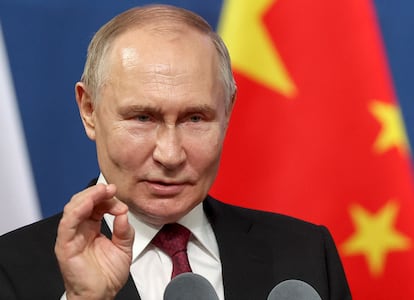Vladimir Putin, the man who knows how to bide his time
The purge in the Russian Ministry of Defense would have satisfied the Kremlin’s two fiercest critics, Wagner chief Yevgeny Prigozhin and opposition leader Alexei Navalny

By dismissing Sergei Shoigu and carrying out a purge among the leading figures in the Russian Defense Ministry, Vladimir Putin has satisfied two of his fiercest (and no longer among the living) critics: Yevgeny Prigozhin, the founder of the Wagner mercenary group, and the opposition politician Alexei Navalny. Prigozhin accused former minister Shoigu of incompetence and called for his dismissal due to the precarious conditions of the Russian army in Ukraine. Navalny focused more on the phenomenon of corruption in the upper echelons of the military establishment and the Russian elite.
Putin has not explained the motivations for the changes in the military hierarchy, attributed by analysts to the need to better manage the war and to rationalize the expenses incurred due to corruption. Formally, the changes do not appear to be linked to the demands and denunciations of Prigozhin and Navalny, both whom have died in traumatic circumstances; the former in August 2023 in an aviation accident and the latter, in February 2024, in a remote maximum-security prison.
Putin has indicated on various occasions that he dislikes being pressured and presents his decisions as sovereign acts unrelated to the complaints he receives. The formation of the new Russian government, after taking office as president for a fifth term, has given him the opportunity to make changes as part of an institutional procedure. On May 12, Shoigu, who had been in charge of the defense portfolio since 2012, was transferred to assume the role of secretary of the Russian Security Council. In parallel, there have been dismissals of a different nature in the ministry. Timur Ivanov, deputy defense minister since 2016 and responsible for the ministry’s construction activities, was arrested at the end of April on suspicion of accepting bribes. Lieutenant-General Yuri Kuznetsov, head of the personnel section since May 2023, who has also been accused of corruption linked to the ministry’s construction activities, was dismissed.
The Anti-Corruption Foundation (FBK), led by Navalny, had conducted investigations into Shoigu and Ivanov. As early as August 2013, a documentary produced by the organization claimed the then-defense minister owned a plot of land in a luxurious area on the outskirts of Moscow valued at over $5 million based on the exchange rate at the time. Subsequently, investigators published images of the minister’s ostentatious residence, an architectural ensemble with a mansion stylized like a pagoda from his home region of Tuva (on the border with Mongolia). The land on which it was built had been officially acquired by Shoigu’s daughter Ksenia in 2009, when she was an 18-year-old student and her father was still serving as Minister of Emergency Situations.
As for Ivanov, the FBK exposed the alleged squandering of his family, which, according to its investigations, had been summering on the French Riviera since 2010 where it rented a huge villa, costing $130,000 a month in 2013. The deputy minister’s family also owned two Rolls-Royces, one in France and one in Moscow, and a 19th-century mansion in the center of the Russian capital that was owned by a company registered in the name of the family’s chauffeur, according to the FBK investigation. In addition, according to the publication Proyect, the Ivanovs also owned a 1,600-square-meter mansion in an elite residential area near Moscow. Neither Shoigu’s nor Ivanov’s salaries were sufficient to justify the property purchases that the FBK and Proyect investigations attributed to them. According to the Dossier Center, which tracks alleged criminal activity among people associated with the Kremlin, the companies supervised by Ivanov were profiting by inflating the expenses for the reconstruction of the city of Mariupol and other occupied localities in Ukraine.
Unlike Navalny, who was against the invasion of Ukraine, Prigozhin aspired to perfect the Russian assault and sometimes openly accused Shoigu of withholding ammunition for the Wagner group’s soldiers. “Now listen to me, bitches, these are somebody’s fathers and somebody’s sons [...] We have a 70% ammunition shortage. Shoigu, Gerasimov, where the fuck is the ammunition?” shouted Prigozhin in a video recorded against a backdrop of a landscape littered with Wagner corpses in May 2023. The chief of the General Staff, Valery Gerasimov, remains in his post. However, on Tuesday the Tass news agency reported the arrest of General Ivan Popov, the popular former head of the Russian 58th Army, who in 2023 clashed with Gerasimov over his handling of the war and is now accused of “large-scale fraud.”
Prigozhin led a rebellion against the Defense Ministry on June 23, 2023, but called off the march of his men on Moscow and struck a deal with Putin, even though the Russian president accused him of “treason.” The episode served to highlight the dissatisfaction that existed at the time in military circles over Shoigu’s management. Two months later, Prigozhin perished when the plane in which he was traveling exploded in mid-air over Tver province.
Putin had a close relationship with Shoigu, with whom he often traveled through the beautiful and lonely landscapes of Tuva, where photo reports showed the president and the minister fishing, camping, or walking through the forests. Given their personal relationship, Putin’s own image could have been damaged if he had dismissed Shoigu without offering a compensation position. The role of secretary of the Security Council is important, but it is removed from the day-to-day management of state affairs. Putin’s reputation would have taken a hit if the minister had been arrested or accused of corruption, as this could have created insecurity for other people in his inner circle. Removing a friend from office while still protecting him and punishing his subordinates and bureaucratic officials seems a less risky formula for trying to make the Defense Ministry more effective. Putin’s actions indicate that he knows how to wait to do things his way, how he wants, and when he wants.
Sign up for our weekly newsletter to get more English-language news coverage from EL PAÍS USA Edition
Tu suscripción se está usando en otro dispositivo
¿Quieres añadir otro usuario a tu suscripción?
Si continúas leyendo en este dispositivo, no se podrá leer en el otro.
FlechaTu suscripción se está usando en otro dispositivo y solo puedes acceder a EL PAÍS desde un dispositivo a la vez.
Si quieres compartir tu cuenta, cambia tu suscripción a la modalidad Premium, así podrás añadir otro usuario. Cada uno accederá con su propia cuenta de email, lo que os permitirá personalizar vuestra experiencia en EL PAÍS.
¿Tienes una suscripción de empresa? Accede aquí para contratar más cuentas.
En el caso de no saber quién está usando tu cuenta, te recomendamos cambiar tu contraseña aquí.
Si decides continuar compartiendo tu cuenta, este mensaje se mostrará en tu dispositivo y en el de la otra persona que está usando tu cuenta de forma indefinida, afectando a tu experiencia de lectura. Puedes consultar aquí los términos y condiciones de la suscripción digital.









































